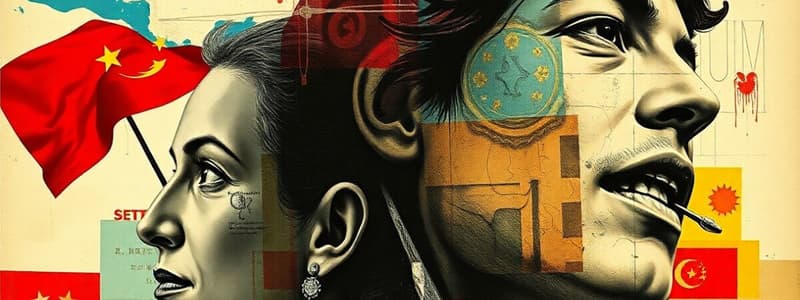Podcast
Questions and Answers
¿Cuál de los siguientes líderes mexicanos logró expandir el movimiento iniciado por Hidalgo?
¿Cuál de los siguientes líderes mexicanos logró expandir el movimiento iniciado por Hidalgo?
¿Qué caracteriza a las guerras de independencia en América del Sur?
¿Qué caracteriza a las guerras de independencia en América del Sur?
¿Cuál fue una de las principales consecuencias de las guerras de independencia en las Américas?
¿Cuál fue una de las principales consecuencias de las guerras de independencia en las Américas?
La independencia de los países de América Central fue consecuencia directa de la independencia de qué región?
La independencia de los países de América Central fue consecuencia directa de la independencia de qué región?
Signup and view all the answers
¿Qué problema significativo enfrentaron los nuevos gobiernos tras las guerras de independencia?
¿Qué problema significativo enfrentaron los nuevos gobiernos tras las guerras de independencia?
Signup and view all the answers
¿Qué factor contribuyó significativamente a la descontento de los criollos en Iberoamérica durante las guerras de independencia?
¿Qué factor contribuyó significativamente a la descontento de los criollos en Iberoamérica durante las guerras de independencia?
Signup and view all the answers
¿Cuál fue una de las motivaciones ideológicas clave que impulsaron las guerras de independencia en Iberoamérica?
¿Cuál fue una de las motivaciones ideológicas clave que impulsaron las guerras de independencia en Iberoamérica?
Signup and view all the answers
¿Qué papel jugaron las desigualdades sociales en las guerras de independencia?
¿Qué papel jugaron las desigualdades sociales en las guerras de independencia?
Signup and view all the answers
¿Qué evento internacional facilitó la creación de un vacío de poder en la administración colonial española?
¿Qué evento internacional facilitó la creación de un vacío de poder en la administración colonial española?
Signup and view all the answers
¿Quién es conocido como 'El Libertador' y jugó un papel crucial en la independencia de América del Sur?
¿Quién es conocido como 'El Libertador' y jugó un papel crucial en la independencia de América del Sur?
Signup and view all the answers
¿Qué características de la política española durante las guerras permitieron que las figuras independentistas emergieran?
¿Qué características de la política española durante las guerras permitieron que las figuras independentistas emergieran?
Signup and view all the answers
¿Qué figura histórica argentinamente clave ayudó en la liberación del sur de América?
¿Qué figura histórica argentinamente clave ayudó en la liberación del sur de América?
Signup and view all the answers
¿Qué aspecto de la economía colonial generó resentimiento entre los colonos en Iberoamérica?
¿Qué aspecto de la economía colonial generó resentimiento entre los colonos en Iberoamérica?
Signup and view all the answers
What was the significance of the Battle of Ayacucho in the context of Latin American independence?
What was the significance of the Battle of Ayacucho in the context of Latin American independence?
Signup and view all the answers
Which battle is recognized for weakening Spanish forces in preparation for the decisive defeat at Ayacucho?
Which battle is recognized for weakening Spanish forces in preparation for the decisive defeat at Ayacucho?
Signup and view all the answers
What characterized the Battle of Chacabuco in relation to Chile's independence?
What characterized the Battle of Chacabuco in relation to Chile's independence?
Signup and view all the answers
What was the outcome of the Battle of Salta during the Argentine War of Independence?
What was the outcome of the Battle of Salta during the Argentine War of Independence?
Signup and view all the answers
What impact did the Battle of Boyacá have on surrounding regions in Latin America?
What impact did the Battle of Boyacá have on surrounding regions in Latin America?
Signup and view all the answers
Study Notes
Overview of the Wars of Independence in Iberoamerica
- The wars of independence in Iberoamerica (roughly 1808-1825) were complex conflicts involving numerous factors, leading to the creation of independent nations from the Spanish and Portuguese colonial empires.
- The Napoleonic Wars in Europe triggered the conflicts, destabilizing the colonial administration and making an opportunity for creole elites.
- The wars had diverse motivations, including class struggles, demands for more autonomy, and rebellion against perceived injustice.
Key Motivations and Factors
- Creole discontent: Creoles, born in the Americas of Spanish or Portuguese descent, resented the control of peninsulares, feeling marginalized from power and wealth.
- Economic grievances: Trade restrictions by the mother countries limited economic opportunities for the colonists, leading to resentment against mercantilist policies.
- Enlightenment ideals: Ideas of self-governance, liberty, and popular sovereignty inspired many across the continent.
- Political instability in Spain and Portugal: The Napoleonic Wars disrupted colonial political structures, creating a chance for independence movements and a vacuum in Spanish governance.
- Social inequalities: The significant gap between privileged elites and lower classes, including indigenous and enslaved populations, fueled unrest and conflict. Slaves and indigenous people sometimes participated, whether unintentionally or intentionally, in the wars.
Key Figures and Leaders in the Wars
- Simón Bolívar: Venezuelan military and political leader, instrumental in the independence of northern South America.
- José de San Martín: Argentinian military leader, crucial in liberating southern South America.
- Bernardo O'Higgins: Chilean general and political leader, instrumental in Chilean independence.
- Miguel Hidalgo y Costilla: Mexican Catholic priest, considered a key figure in Mexican independence. His call for rebellion sparked extensive uprisings.
- José María Morelos: Mexican revolutionary leader, continuing and expanding on Hidalgo's movement.
- Agustín de Iturbide: Mexican military leader who played a role in achieving Mexican independence.
Key Battles of Latin American Independence
- Battle of Ayacucho (December 9, 1824): Decisive battle in the Peruvian War of Independence, ending Spanish rule in Peru and most of the remaining Spanish territories in South America. Bolívar's Colombian army and Sucre's Peruvian forces decisively defeated the Spanish Royalist army.
- Battle of Junín (August 6, 1824): Significant engagement in the Peruvian War of Independence, weakening Spanish forces and paving the way for Ayacucho.
- Battle of Chacabuco (February 12, 1817): Crucial victory for Chilean independence. O'Higgins's Chilean forces, with Argentinian support, defeated the Spanish Royalists, marking a turning point in Chile's independence struggle.
- Battle of Salta (February 20, 1820): Significant battle in the Argentine War of Independence. General Belgrano's Argentine forces defeated the Spanish, freeing important northern areas, though the Spanish continued to fight.
- Battle of Boyacá (August 7, 1819): Critical battle in the Colombian War of Independence, removing a major obstacle for independence movements in Gran Colombia. Simón Bolívar's forces decisively defeated the Spanish, facilitating independence efforts in nearby regions.
Regional Differences and Battles
- South America: Military campaigns, such as those led by Bolívar and San Martín, encompassed various regions, including the Andes Mountains.
- Mexico: The Mexican War of Independence involved popular uprisings, guerrilla warfare, and military campaigns. Battles at Morelia, Calpulalpan, and Valladolid were significant aspects of this war.
- Central America: Central American countries gained independence after Mexican independence but faced ongoing instability and internal political divisions.
Consequences and Legacy
- The wars created new independent nations, substantially changing the colonial map.
- Independence brought political instability, social upheaval, and struggles for stable new governments and institutions, facing intricate social and economic changes.
- The wars had enduring effects on the economies and social structures of independent countries, leaving a lasting legacy.
- New power structures often overlooked indigenous and enslaved populations, perpetuating inequality and conflict.
Studying That Suits You
Use AI to generate personalized quizzes and flashcards to suit your learning preferences.
Description
Este cuestionario explora las diversas causas y motivaciones detrás de las guerras de independencia en Iberoamérica entre 1808 y 1825. Analiza la influencia de las élites criollas, las luchas de clases y los agravios económicos que llevaron a la formación de naciones independientes. Conoce cómo los acontecimientos en Europa, como las Guerras Napoleónicas, impactaron en estos conflictos.




